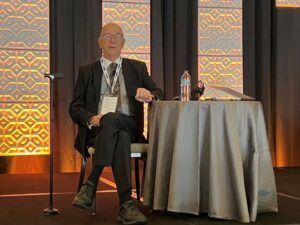The NSCA Business and Leadership Conference (BLC) 2025 began with its customary deep-dive into the economic landscape, led by NSCA economist Dr. Chris Kuehl. Against the backdrop of global uncertainty, Dr. Kuehl shared valuable insights into the challenges and opportunities businesses face, focusing on three key concerns that are top of mind for economists: inflation, workforce participation and regulation-related issues.
Inflation and the Impact of Tariffs
Dr. Kuehl was upfront about inflationary pressures, predicting a rise driven in part by tariffs. He explained that tariffs operate as indirect taxes on American importers, often leading to higher costs for consumers. “Inflation is definitely going to increase. There’s no way it can’t because of the tariffs,” he noted.
The Personal Consumption Expenditures (PCE) price index, widely considered the most accurate measure of inflation, currently stands at 2.6%. If inflation increases as anticipated, it could slow the Federal Reserve’s interest rate cuts, keeping borrowing costs high. This scenario may lead to restrained investments in both construction and technology — a significant consideration for businesses planning their financial strategy.
Dr. Kuehl also suggested that tariffs may be serving as negotiating tools, with their actual implementation subject to political shifts. For instance, leadership changes in Canada could pave the way for improved U.S.-Canada trade relations.
Related: CEDIA Webinar Recap: Navigating Tariffs in the AV Industry
Workforce Participation & Labor Shortages

Dr. Chris Kuehl kicks off NSCA #BLC2025 with vital insights on inflation, labor challenges and regulations amid global uncertainty. Photo by Dan Ferrisi
Labor force participation remains a critical issue, with the civilian workforce participation rate at 62.6%, still below pre-pandemic levels. This ongoing labor shortage is a particular challenge for industries reliant on human capital.
Adding complexity to the labor market is the rise of artificial intelligence (AI). While Dr. Kuehl acknowledged that AI could impact routine, repetitive roles, such as entry-level accounting positions, he expressed confidence in the resilience of human-driven, service-oriented jobs. These roles, which depend on interpersonal interaction, are less susceptible to automation in the near term.
Regulation and Compliance Costs
The session also highlighted the burden of compliance costs and regulatory hurdles for businesses. Dr. Kuehl noted that trimming administrative budgets could ease these challenges, though he urged caution. Agencies like USAID, while sometimes viewed as cost centers, serve strategic purposes such as strengthening American “soft power” abroad and facilitating business expansion into global markets. Reductions in such initiatives could open the door for other global players, like China, to increase their influence.
Adapting to the Road Ahead
Dr. Kuehl’s insights underline a complicated but navigable path forward as integrators prepare for 2025. From monitoring inflation trends and adjusting investment strategies to addressing labor shortages and understanding the evolving regulatory environment, there are actionable steps leaders can take to position themselves for success.
Stay tuned for more insights from #BLC2025 as industry experts share their strategies for navigating these complex economic challenges.










